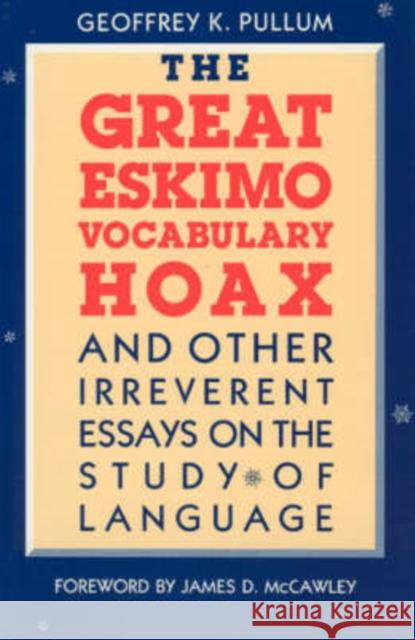The Great Eskimo Vocabulary Hoax and Other Irreverent Essays on the Study of Language » książka
The Great Eskimo Vocabulary Hoax and Other Irreverent Essays on the Study of Language
ISBN-13: 9780226685342 / Angielski / Miękka / 1991 / 246 str.
The Great Eskimo Vocabulary Hoax and Other Irreverent Essays on the Study of Language
ISBN-13: 9780226685342 / Angielski / Miękka / 1991 / 246 str.
(netto: 145,80 VAT: 5%)
Najniższa cena z 30 dni: 152,46
ok. 30 dni roboczych
Bez gwarancji dostawy przed świętami
Darmowa dostawa!
How reliable are all those stories about the number of Eskimo words for snow? How can lamps, flags, and parrots be libelous? How might Star Trek's Commander Spock react to Noam Chomsky's theories of language? These and many other odd questions are typical topics in this collection of essays that present an occasionally zany, often wry, but always fascinating look at language and the people who study it.
Geoffrey K. Pullum's writings began as columns in "Natural Language and Linguistic Theory" in 1983. For six years, in almost every issue, under the banner "TOPIC. . .COMMENT," he published a captivating melange of commentary, criticism, satire, whimsy, and fiction. Those columns are reproduced here-almost exactly as his friends and colleagues originally warned him not to publish them-along with new material including a foreword by James D. McCawley, a prologue, and a new introduction to each of these clever pieces. Whether making a sneak attack on some sacred cow, delivering a tongue-in-cheek protest against current standards, or supplying a caustic review of some recent development, Pullum remains in touch with serious concerns about language and society. At the same time, he reminds the reader not to take linguistics too seriously all of the time.
Pullum will take you on an excursion into the wild and untamed fringes of linguistics. Among the unusual encounters in store are a conversation between Star Trek's Commander Spock and three real earth linguists, the strange tale of the author's imprisonment for embezzling funds from the Campaign for Typographical Freedom, a harrowing account of a day in the research life of four unhappy grammarians, and the true story of how a monograph on syntax was suppressed because the examples were judged to be libelous. You will also find a volley of humorous broadsides aimed at dishonest attributional practices, meddlesome copy editors, mathematical incompetence, and "cracker-barrel philosophy of science." These learned and witty pieces will delight anyone who is fascinated by the quirks of language and linguists.
"











